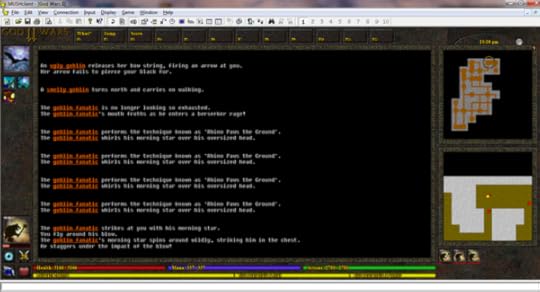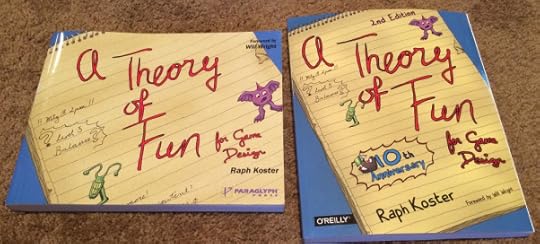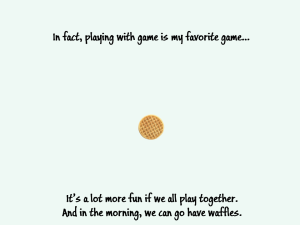Raph Koster's Blog, page 16
January 2, 2014
Self-promotion for game developers

Sometimes the universe does drop your dreams and heartfelt desires in your lap. But usually you have to at least say please, and most of the time you have to fight for them.
I’m writing this for Mattie Brice, who was just listed as one of Polygon’s 50 game newsmakers of the year. We had a brief Twitter exchange after I offered congratulations, in which she mentioned that she didn’t know she could put this on a CV, and that she “know[s] nothing of self-promotion.” I have certainly never been accused of that, so this is a rehash of stuff I have written elsewhere and elsewhen.
To be clear, this post is not about marketing your games. It is about marketing yourself, and not even that, but about finding your professional place within the industry.
Why self-promote?
The fact is that the world is a) crowded and full of distractions b) competitive and full of other people who do what you do. Getting noticed is hard. Staying noticed is also hard. You can be utterly amazing and people can simply not know. You can be utterly amazing and people can simply forget. The result, simply put, is that without self-promotion you won’t get to do all the things you want to do. Yes, sometimes the universe does drop your dreams and heartfelt desires in your lap. But usually you have to at least say please, and most of the time you have to fight for them.
Some myths
Self-promotion does not mean pushing others down. In fact, when done most effectively, it is actually done by pulling others up. It does not mean falsity; in fact, it is usually best done by being genuine. It does not mean being crass; when done well, it usually simply means being firm and matter-of-fact. If these things are your impression of what self-promotion is, please discard them. They are good warning signs to see in someone else, though — they may be trying too hard, or might need advice on how to best present themselves.
The first steps
Do good work. Without this, all else is pointless. This means, yes, paying dues, studying up, all that drudgery. Hopefully you love it, because otherwise you should do something else. If you do not take your field seriously enough to study it, and try to know everything about it, and try to add new knowledge and understanding to the field, then you probably shouldn’t be self-promoting.
If you do not take your field seriously enough to study it, and try to know everything about it, and try to add new knowledge and understanding to the field, then you probably shouldn’t be self-promoting.
Sadly, valid reasons like “I don’t have enough money to afford the games/books” won’t matter… I wish they did, but it’s not how the world works right now. So find ways to study and learn by hook or crook. Or you’ll find yourself in situations where others trust you to make something happen and you won’t be able to because you’ll be hollow words. Don’t hurt others that way, and don’t hurt yourself that way. The corollary is, be aware of what you are not good at.
When you talk with someone, think about how you can be helpful to them. Self-promotion fundamentally is done by getting others to give you a leg up. You do this by being helpful to them, so that they reciprocate. Often that will mean pointing people towards someone who isn’t you, because they can help more than you can. The result will be that people (both the ones you pointed away from yourself, and the ones you pointed them to) will remember you as helpful and honest and generous.
After doing work, you use what you learned to help others
Share lessons learned. You don’t need to have a hugely advanced career or be a massive expert. In fact, a lot of lessons learned by people who have lots of skill aren’t that useful to novices, who might be lost in the nuances it provides. How to share? Write. Forums like blogs, Twitter, communities of practice and so on where you can interact with others in the industry are very important for getting your name out there.
It doesn’t need to be a big or famous forum. I got started on MUD-Dev, and before that, on Usenet. In the case of MUD-Dev, it was an obscure forum to start with, so I promoted the forum whenever I got the chance. A lot of the MMORPG industry might well have never heard of it otherwise, so I encouraged them to join it. It helped that it was a high-quality forum to start with.
Don’t think industry only, either. I have found enormous value in contacts from the science fiction world, from the legal world, from academia, and so on. Everything is relevant to your work. Everything.
Everything is relevant to your work. Everything.
Getting to know diverse groups of people and finding out what they think of what you do is immensely valuable.
Share failures. Sharing triumphs is always nice. But gosh, there’s almost no advice as good as a signpost that says “watch out, a flood washed out this road.” You will earn respect for being honest enough to admit mistakes. It will not harm your standing at all. Anyone who matters will have made plenty of mistakes of their own. You will learn more about those mistakes from writing about them, and that will make your own work better. Finally, others will be able to seize on your mistakes and do something with them that blows you away.
Ask yourself whether what you are saying is something that others will find useful.
Provide tools. Don’t just criticize, pontificate, rant, pump your fist, or philosophize. Ask yourself whether what you are saying is something that others will find useful.
It can be challenging and useful. It can be philosophical and useful. It can be angry and useful. If it isn’t useful, it’s probably just useful to you. And that’s fine, but it’s not generous. And self-promotion is fundamentally about generosity.
Be nice. You can be critical and be nice. You can call out bad behavior and be nice. It’s a small industry. I have a list, as many veterans do, of “people I will never work with again.” It is small. But everyone has a list, and some people’s lists are very long. From a purely practical point of view, burning bridges is a bad idea. Worse, and I think everyone needs to confront this, at least some of the nasty stuff you want to say is wrong, and you just don’t know the real situation. It happens to all of us.
This doesn’t mean not taking a stand. It means being professional as you do so, and being sure that what you say is grounded in reality that is as objective as you can make it.
Then you take credit
This is the part that people fall down on.
Get proper and public credit for your work. When I was originally credited on Ultima Online, it was as “creative lead,” not as “lead designer.” UO shipped without a lead designer (long story). But creative lead is not a useful title on a resume. I made a point of asking for and getting the title of lead designer on UO Live (running the service) when they asked me to do UO: Second Age. That way I was able to legitimately refer to myself as lead designer on UO later on.
Needless to say, don’t falsify what you did in any way whatsoever. It is dishonest and it will come out and blow up.
Being a doormat is a good way to lose out. (I am a doormat by nature, btw. This is very hard for me). There was once a piece of technology that I was absolutely critical to inventing. It would not have happened without me, and I solved many of the core challenges with it. I certainly was not the only one who worked on it. As it happens, others who worked on it were the ones who filled out the patent paperwork, and my name wasn’t on it. I didn’t insist. Regardless of how you feel about software patents, that was a mistake. Stand up for yourself and your contributions.
This is especially important because odds are very good that well over half your career will be “dark matter” — stuff that will not be seen by the public. So those parts that are seen matter more than you think. I have a long list of major, significant projects that occupied years of my time… that never saw the light of day and are still confidential. They don’t live on the resume. They don’t live anywhere except in some people’s memories. You can use these in conversation sometimes (depending on legalities) but that’s about it. So getting credit for work that actually shipped is very important.
Say “we” not “I.” Because it’s almost always the truth.
In general, be humble. Fact is, if you had a big success, it’s because you were goddamn lucky.
Fact is, if you had a big success, it’s because you were goddamn lucky.
Because you had the right help. Because the time was right. Because your parents. It is never all attributable to your genius. I say this as someone who actually is a polymathic genius, so I know what I am talking about.

Don’t bother denying that you’re self promoting. If you’ve been honorable about it, it won’t be resented. It only gets obnoxious when you overdo it. Admit it with a grin, and point out “I gotta eat.”
Some very specific things you should be doing
Have your own website, and have a portfolio of some sort on it. Ideally, the website’s domain is your name. Yes, it’s wonderful and all to write on Medium or Google+. Medium is going to get shut down someday. Slideshare and its widgets will be the detritus of history in fifteen years. Post/host copies of everything you can on your own site. Make it your clipping book. Don’t sign speaking contracts that say you can’t post up a copy or a reworked version somewhere.
Don’t write intermittently. You have to do it regularly. It is a chore like watering a plant. Reputations dry up and wither away.
Make it easy to find out about you. Post up a CV and a more digestible summary on your site. Too many people think the About Me section is filler. It’s not! Develop a bio you can give people, and update it periodically. The back of my business card actually has a short resume on it. After all, if I am meeting someone who doesn’t know me, what better way is there to let them know quickly, in a way they can take away with them? (I debated on this one, because it’s definitely somewhat obnoxious, but ended up deciding to stand on my record).
Learn to give good pull quotes. This is a skill, and it’s one you can and should build. Let me give you a tour of some quotes associated with me:
Single-player is a historical aberration.
The client is in the hands of the enemy.
Fun is just another word for learning.
With games, learning is the drug.
Games are made out of games.
Narrative is not a mechanic. It’s a form of feedback.
It may be that games are all about math. And I think that sucks.
Why is there no game about the taste of a freshly picked peach?
Pithy quotes are what make it into the write-up of your talks.
Now, you may agree with these or not. Some of them, I wasn’t the first one to say! What they have in common, though, is that they are direct statements that take a stand, are brief, and practically demand follow-on exposition. Sometimes I have gone too far with these — no question! — but I can tell you that the value I have gotten from being able to supply pithy quotes is immense. Pithy quotes are what make it into the write-up of your talks. Pithy quotes are what gets you on TV or radio. Pithy quotes are what get cited in academic papers. Pithy quotes are what gets someone to debate you — and the more you are debated, the more awareness others have of you and your work. Nobody bothers to debate a nobody. Being a bit controversial is a good thing. Being highly quotable is an asset.
By the way, jargon is the enemy here.
In fact, have a stock phrase library. When I first started meeting relatively famous people socially, I was shocked to discover that after a few interactions with them, I noticed that they had a set of stock phrases and witticisms, a go-to set of anecdotes, and so on. Sometimes they slipped up and used the same phrase twice on the same person in different meetings. Oops. The thing is, if you hit on a way of saying something that works, don’t stop using it. Use it again, Polish it. Retell your stories. This may seem theatrical, but there is a very real sense in which self-promotion is putting on a performance of the person you want to be.
Think about your appearance. It doesn’t have to be good. Oh sure, some folks make a point of always having a suit in a public appearance, Steve Jobs liked his black turtlenecks. In my case, my look is “rumpled.” Yes, I have had multiple other people describe me to myself that way. It’s a consistent rumpled, is my point. Warren Spector’s is “professorial,” I mean, have you seen his sweaters? Have photos that show who you are, too.
This may seem like the shallowest thing ever. But there’s two big reasons to do it: one, it’s a signal to yourself that you are taking this seriously. Culturally, we as humans dress up for ritual and ceremonial moments. Your work is a ritual, your work gathering is a ceremony. Grant it that importance. Honestly, if you do it right, it’ll be the clothes you like to wear. Two, it makes you memorable. No one who has met George “The Fat Man” Sanger, in rhinestone jacket and cowboy hat, forgets it.
In a weird sense, you want to be a bit of a cartoon. Why? Because cartoons, icons, are what we reduce things to in our heads. (You remember those parts of Theory of Fun, right?) A memorable cartoon is more valuable than a complex forgotten person, in this case. This doesn’t mean being cartoon-y. It means having some signature stuff that you get associated with. Having poetry in my talks or my blog is one of those signatures, in my case.
If you can, get media training and/or public speaking training. It’s a shortcut to learning a whole lot of stuff you will otherwise learn the painful hard way when you get misquoted, say something you shouldn’t have in public, and so on. The quick and easy way? Find a local Toastmasters club or something. You will need this for when you do an interview. You will need this when you demo. I could write a whole very long post just on public speaking techniques, but this is already long.
A corollary applicable especially to those on large teams: Learn marketing. One thing that CliffyB and Warren Spector and Will Wright and many others have in common is that they give good press. Besides, this is just a valuable thing to have on your team anyway. Every team needs a good song and dance person. Get comfortable with public speaking. Develop a sense of humor if you haven’t got one. Be very good at demoing. Be articulate in interviews. Get comfy on camera. Your marketing dept will start asking for you because devs with these skills are rare and valuable. As part of this, get to know folks in the press. They are also valuable contacts. Being the lowest-ranked booth monkey at E3 is remarkably good training for this.
Do conference talks. I owe Rich Vogel and Gordon Walton an enormous debt for starting me on this path. It leads to a lot of recognition. It gets your name out there. It’s worth pointing out that I am pretty sure that EA did not value me significantly if at all after UO came out. They didn’t fight to keep me, and at one point I was on a firing list (I hear). But the rest of the industry saw me as valuable. Leaving EA helped my career quite a lot in that sense, because there was press about my departure, and there was a press release when I joined SOE, and there was a press release when I was made CCO. The foundation of the reputation I have is not the work, it’s awareness of the work. Conference talks directly target your peers.
Is it hard to get started doing this? Yes. You’ll get rejected a lot. I still get rejected now. Don’t worry about it, don’t take it personally. Just get up and submit again.
Finding yourself
Get to know the right people. Much of self-promotion is merely moving in the right circles. A large part of this is actually credibly belonging in those circles. If you don’t, you’ll quickly find out. But try to get to those circles if you think you belong there. Sometimes they are not obvious — few folks outside the industry would pick, say, Eric Zimmerman, as a key figure. But he has a very very good Rolodex (or modern equivalent). He is connected to a lot of movers and shakers. He is a thought leader himself.
Don’t break into circles because you want the contacts. Break in because you think you belong there, because you want to be there, because you like the people there. It is about finding your “tribe.” (Odds are good, by the way, that your tribe isn’t actually the biggest names out there today. But you know what? They are actually very approachable, by and large. So don’t rule it out!)
If no such circle exists, create it. GDC started because Chris Crawford wanted his tribe around him to talk games. For years, us online folks ran a parallel conference next to GDC because we wanted our tribe. The so-called formalists — all half dozen of us! — get together for dinner now whenever we are in the same city.
Don’t view your life through the lens of self-promotion, that way lies fakery. There are a lot of “secret game developer mailing lists” and the like. When I was first invited into one, my first thought was “oh, this sounds COOL.” The “valuable contacts” thoughts came about fifth or sixth on the list. I say this because it might be that all this probably sounds too cynical. But I can honestly say that I tend to think of the self-promotion angle after the fact. Going in there with that intent will just make you seem fake, I think. Be honest in your life, I guess is all I am saying.
Bottom line: Give back. Don’t be a dick. Seriously.
Bottom line: Give back. Don’t be a dick. Seriously. Share what you can, be generous with your time, build relationships honestly. Don’t claim credit for things you didn’t do. Anything else is unethical and a longterm disaster anyway. Share with the industry, contribute to the field. And make sure that people know you did. It earns respect, and that’s the core of self-promotion.
A crass monetary note
I see a lot of folks who think that unless money is rolling in, they are failing. This especially seems to be a feeling among people who write about games.
I know exactly one person in the entire industry who makes a living freelance just writing about games. They are not rich.
It is a mistake to associate the kind of reputation I am talking about in this article with financial reward.
It is a mistake to associate the kind of reputation I am talking about in this article with financial reward. It does not necessarily correlate. What this stuff does is open doors, not cause money to rain down on you. The people with the most money in the industry are often not widely respected, not leaving a legacy behind… All this self-promotion is for the purpose of giving you opportunities, and making it easier for you to take those opportunities. Many of those opportunities will be about exciting work and meaningful personal relationships. Some will be about money too — proper self-promotion helps the career. It goes like this: the self-promotion helps the career, but the career is supposed to help the happiness.
So pay attention to the happiness.
For reference: here’s what I put on my CV. If I make it onto a list like Mattie just did, hell yeah, I put it on there.
December 31, 2013
Year in Review

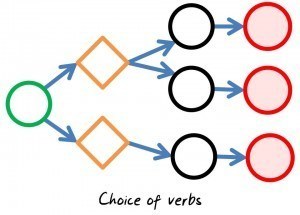 I didn’t write that much on the blog this year. It has had the lowest traffic in years, as a result. I only know this because I actually bothered to go look at the stats, for the first time in ages. I used to track this stuff every month, adding it into a big spreadsheet, so I could keep track of what people wanted to read about. Of course, I was also spending an hour a day or more writing stuff here, back then.
I didn’t write that much on the blog this year. It has had the lowest traffic in years, as a result. I only know this because I actually bothered to go look at the stats, for the first time in ages. I used to track this stuff every month, adding it into a big spreadsheet, so I could keep track of what people wanted to read about. Of course, I was also spending an hour a day or more writing stuff here, back then.
With the big blog revamp, it occurred to me to do an oldschool “this is what happened on the blog this year” post like I used to. So… here we go:
The most popular posts I wrote this year:
On getting criticism:
A post I wrote about how to deal with inbound criticism of your work. This was the most read thing on the site all year, and has popped up in all sorts of incongruous places; I’ve found it reprinted in Reddits about fitness or about stand-up comedy, in countless game forums, and on websites for self-published writers, artists, and so on.
A Letter to Leigh
I want to believe that despite the political layers that adhere to the discussion of this topic, that we are all craftspeople who care about the carpentry of what we do. We all need to reach our own accommodations and understand our own aesthetics. – “A Letter to Leigh”
A close second. This post was prompted by some tweets by Leigh Alexander, and resulted in a giant cavalcade of posts from many sources, many full of vitriol, kicking off a months-long discussion in many quarters. It was one of the first things I wrote after leaving Disney, at a time when I wanted to engage more freely and deeply with the many currents swirling about in games, and is basically about the lack of agency in many of the art games and AAA games today.
Yiynova MSP19U: A Cintiq Alternative
A lot of artists out there want a lower cost alternative to Wacom, apparently! I have in fact since upgraded to the Yiynova MVP22U(V2),
 which is larger and has a better pen and tracking, an IPS screen, and alas, font rendering that is flawed.
which is larger and has a better pen and tracking, an IPS screen, and alas, font rendering that is flawed.Playing with “game”
This post was an attempt to better reconcile “formalism” as it had gotten called, and the current critical discussions that mostly centered on personal expression and subjective reactions. Honestly, I don’t think they actually needed reconciliation — there was never a conflict there in the first place — but it seemed to me that by changing some terms on the formal crfat side, we might be able to avoid misunderstandings. I later reused this title for my GDCNext talk, about which more later.
Programming languages for aspiring designers
This came from a Quora answer I gave, and the short form of the post is “learn whichever one you will actually stick with,” because giving up is a far bigger problem than whether you picked the “right” language for an ephemeral moment in the industry.
On personal games
This post was about three things: a) my own games have not tended to be autobiographical b) even though I have quite a lot to mine there and c) that sometimes one’s artistic goals can be about things other than personal expression. A lot of the subsequent discussion became about the experiences of Third Culture Kids and those of similar backgrounds.
Windows 8 tablet, part two
Another post caused by my leaving the paid-for tools of corporate life behind and having to buy all new gear for myself. This one, I suspect, drives traffic because it is actually just a helpful list of things to adjust or change in a new Windows 8 install.
Moving on from Playdom/Disney
The defining event of the last year for me, of course. Though I have trouble disentangling it from events in the previous year. The events leading up to departing were massively stressful and occurred in slow motion, and smack in the middle of them came getting the Online Game Legend Award, which basically came as a massive vote of confidence in my career and work right when everything was pushing towards the opposite.
On choice architectures
…the question of what makes systems richly interpretable – as opposed to their dressing in the form of words, art, and music – is an interesting and important one. – “On choice architectures”
This is effectively another post in the large conversation started by “Letter to Leigh.” In it, I attempt to break down and analyze the different ways in which designers present choices to players in games. A lot of folks don’t think there are any choices in games. They’re wrong, and I think it’s because they haven’t played enough kinds of games.
Requiring online for single-player
This was written in reaction to the debacle around the online connectivity requirement in the latest iteration of SimCity. Basically, it’s a reiteration of the fact that requiring connectivity for everything and renting you everything is just the way market forces are pushing everything.
That said, the commonest topic on the blog was of course the new edition of A Theory of Fun for Game Design .
.
Older posts that were popular:
These posts date from earlier, and yet people keep reading them.
ARPU vs ARPPU, from 2009.
The Fundamentals of Game Design, which actually dates back to 2007 but was published on the blog in 2010.
How to hack an MMO, from 2008.
Narrative is not a game mechanic, from 2012.
Project Horseshoe: Influences, from 2006, likely because Jon Blow links to it.
The best game design articles on the site, from 2012.
How well can indie games do?, from 2009.
Ultima Online is fifteen, from 2012.
UO’s resource system, the first post in a series of three about this topic, from 2006.
F2P vs subs, from 2012.
Shame on me
I only posted one piece of music. Download audio file (Freedom.mp3)
I also only posted one poem, “Descending to the Airport at Night.”
Search terms
Just a selection of the non-boring ones from the top results.
arppu comes in at the top.
yiynova msp19u & cintiq alternative
ultima online or uo
ralph koster, raph coster, or rapk koster, because my name is so hard
how to hack mmo games, how to hack mmorpg, hacking mmos, how to hack an mmo and many other variants
“raph koster says tetris would be a different game if:” (someone assigned this as a class question maybe?), raph koster tetris, and more along those lines
My thoughts on the year
This year should have been defined by going indie and publishing a lot of stuff, both games and writings. (And indeed, I have a lot of games in progress. Just none of them are done yet). I had many many things I wanted to write about: the evolving definitions of the medium. The techniques of rhetoric used in experience-centric games. The cultural problems we face in a world of services and clouds. The fact that we are slipping inexorably into a world where the work that is noticed will increasingly be the most exploitative on many levels.
And of course, about the games I am making. The card game, about which I hope to have exciting news in the new year, and which tested so well while I was in Argentina. The board/puzzle/story game that is the first time I’ve tried actually doing a “personal story.” The new fantasy world I’ve worked up, and the turn-based strategy game set in it. The other little boardgame that I don’t know what to do with. The casual puzzle title with the potentially supercute characters.
Instead, if I am honest with myself, the year was defined by the incredibly contentious critical discussions on blogs and Twitter. Every time I wrote anything at all about games, I pressed the “publish” button with a combination of apprehension and hope. Sometimes, actual fear, and the fear won. This was the year that for me, the illusion of collegiality in the field was shattered.
As a result, I ended up never writing literally dozens of posts. I thought about commenting on various industry trends, and shrugged and didn’t. I didn’t push hard enough to finish my games. People started to ask me if I had retired. Insecurity piled on insecurity.
My attitude towards this during the year was to tell myself that by not writing, I was avoiding fanning the flames of pointlessly personal contention. That I was taking the high road in not responding to personal insults. Sometimes I reminded myself that I do have lots of privilege and standing in the industry, and that the slightest remark I make can potentially carry a lot of weight.I looked over everything I had said, and apologized (or tried, anyway) multiple times for perceived slights that were not intended. I feared for the reception of any game I made, because the thoughts I was thinking could not help but influence how I made them… and that paralyzed the work.
In practice, I saw that when I made what I believed to be substantive points, they usually got ignored in favor of seizing on single words or phrases that could be selectively quoted. And of course, by not participating I was simply leaving that response as the final word. I would click on a link and (I am not exaggerating here) read it and then be able to measure a 20 point rise in blood pressure with the cuff I keep by my bed. That queasy sick feeling in the middle of the chest, and how the sweat breaks out on the forehead.
It happened to me this morning. I feel it right now.
Even as I write this, I can imagine the derision that will come from some quarters. Some might actually say “good, now you know what it feels like for us all of the time.” Some might actually have disbelief that this was what it felt like.
But this was the year when an editor at a games publication actually said to me “stop writing.” This was the year that the metaphors of violence were the most popular way to describe what we should be doing to each other’s life work and passions. Burning down. Destroying. This was the first year in my career where I have had multiple conversations with people at conferences about the fact that they actively feared what others in the field might do to them or say about them. The advice I got in private conversations was “don’t let it get to you,” was “let it just burn out,” or the paradoxical “just focus on the work” …when both the games and the writing about games are the same work, and so is the interacting with others who also do the same work.
There has always been an ugly side, don’t get me wrong. There have been plenty of revolting personalities in the industry. There has been lots of sexism, plenty of racism, unsavory business practices galore.
But for me, this was the year the bad stuff tipped over. And it tore at me precisely because it happened as we as a field, as a community, had victories. Of inclusion, self-awareness, and artistry. Another reminder, I suppose that bad people, or good people behaving badly, can do good work.
So, I have a New Year’s resolution. It’s to ignore the fear as best I can. (I can’t make it go away, of course). Not just the fear of making, or of putting work out there. But also the fear of not being liked. There’s only two ways I know of to help improve the overall tone. One is to try to be a positive model and evangelize the good. But I think I need to not be afraid of calling out what I think is bad. I need to be less nice.
And now, before I second-guess myself, I need to hit Publish.
December 29, 2013
Art section updated

The gradual conversion of the old site into the new format continues. Old links out there still point to old pages, since I haven’t put any redirects in. But the new pages are appearing, and if you are mostly hitting the front page of the site, the menu choices will start pointing to the new pages rather than the old. Don’t worry, I won’t switch over the top pages until all the lower pages are in place!
[image error]
[image error]
[image error]
[image error]
[image error]
[image error]
[image error]
[image error]
[image error]
[image error]
[image error]
[image error]
Today, it was the long-neglected Art section that got an overhaul. I rarely do art anymore… heck, I rarely doodle anymore. Most of my art efforts go towards game making, actually. But one upon a time, I could draw, and if you want the evidence, well, there it is. I rescanned all the stuff I could find and it looks better than it ever has on the site before, and there’s a bunch of pieces that I haven’t shared before there too. The little gallery here isn’t all of it, just a smattering.
I have yet more but they are mostly too large to fit in my scanner. I’ll have to see what I can do about those…
In the meantime, if you happen to see anything out of whack in the Art section, let me know in the comments here! I am sure there are bad links, layout issues, and the like.
December 18, 2013
Major blog overhaul

 You may have noticed that the site looks a little different today! It has seen a major overhaul — years of hacks in files have been overwritten by a modern customizable theme (Suffusion).
You may have noticed that the site looks a little different today! It has seen a major overhaul — years of hacks in files have been overwritten by a modern customizable theme (Suffusion).
The goals were
Get it looking nicer, because, damn, it was dated. I usually overhaul it every few years, and it’s been overdue.
Get it faster and more responsive, thanks to streamlining all the cruft away. We’ll see. The database for the blog is, by the way, around 5GB of data. Yeesh. So it may be that getting it faster will require major DB surgery.
Cut away some of the stuff that was outright obsolete, like the links list (I’ll have to create a new one, sorry for anyone I wiped out!)
Give better and faster access to frequently desired material. This is being done with the nav bar up at the top. You’ll notice that this still takes you to the old site’s static pages (static pages that now date back to 1998 in some cases). Over time I expect to migrate all this into WordPress proper and redirect all the old links.
I also plan to add new stuff now. Like, some gallery pages for the games I have worked on. Seems silly to be a game designer with a game design site and not have a portfolio page… There’s also all the books that I have had chapters in, I ought to have those up here too. Maybe Slideshare widgets for all the presentations.
Among other things, the site is now fully responsive, so it shouldn’t take pinching and zooming to read it on a smartphone anymore. I swapped out the tag cloud widget, and the translator widget too. The old translator actually cached all the pages; this one just sends you off to Google Translate to do it yourself, so that should save a lot of space.
There are still many things that I have to sort out: whether to keep the frames on images, the weird bottom edge of the nav bar, what to do about comments (I like having the Twitter comments show up seamlessly, but I don’t think I like the reverse chronological order they show up in!), how to handle the older parts of the site, the bits of stuff left over like the blue highlighting of my comments that no longer matches the theme, the way drop caps are messing up when there’s an image in the top left, the bad headers on the right side…
Of course, feedback is welcome! Let me know what you think of stuff like the color scheme, the layout, and so on.
December 17, 2013
Imaginary Realities is back!

And here’s the link to Imaginary Realities vol 5 issue 1!
For those who don’t know, Imaginary Realities is the mud-related journal originally published by David Bennett. It disappeared way back in 2001, but Richard Tew has resurrected it. I’ve already glanced through the first new set of articles, and there’s some interesting stuff there for both MUD devs and non-mudders, I think.
All the original issues are mirrored, so if you want to look at the stuff that ran from ’98 to ’01, it’s there too!
December 5, 2013
Touring the print edition of Theory of Fun


The print edition is out! Yay! Hopefully I get author’s copies tomorrow.
In celebration, I thought I’d share some images of what it looks like now. I really couldn’t be happier with how it turned out. All glossy and hefty, it feels very substantial and classy. And I have trouble going back to look at the black and white now, having grown used to color everywhere. Read on for some before-and-afters on the imagery, some looks at the text additions, and how I tackled the issue of revising away some of the sexism in the cartoons!
The first thing, of course, is the layout. Yes, it’s in a portrait layout now, instead of the horizontal format. Not only will it fit better on shelves, but it also means that the book shouldn’t fall out of stock as much, because we selected this layout because we can use Print On Demand to constantly keep hard copies available. Before, copies had to be manually ordered.
Ironically, the actual size of the book is almost exactly the same. The new edition is actually just slightly larger.
Here is an example of how the interior layout has changed. Not only are all the pages glossy throughout, but the font is more readable too. You can also see that we are using new fonts for the captions throughout — these are actually based on my handwriting, and are the same ones that you can see in the “Ten Years Later” presentation I gave at GDCOnline. Of course, the acknowledgements section has gotten a little larger now…! A whole host of people kindly offered to read the original version of the book and offer up their critiques of it. Their comments powerfully shaped the revisions in the new edition, and they are all thanked here. You might recognize some regular blog readers and commenters!
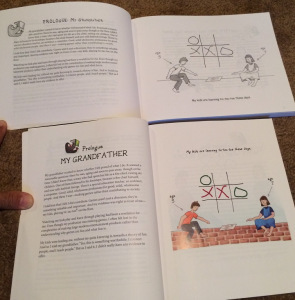 This is another view of how the layout works now. I had to edit many of the cartoons to work better as vertical layouts. In the process of redoing the captions, I also pulled them all off the image (since they were hand-inked before) and inserted them digitally as text with the custom font. That lets us in theory do translated versions much more easily, since image editing won’t be required for hand-drawn text all through the images.
This is another view of how the layout works now. I had to edit many of the cartoons to work better as vertical layouts. In the process of redoing the captions, I also pulled them all off the image (since they were hand-inked before) and inserted them digitally as text with the custom font. That lets us in theory do translated versions much more easily, since image editing won’t be required for hand-drawn text all through the images.
Many of the cartoons were much harder to translate into vertical than this. There are a few that I had to basically leave intact and just center on the page. Others had a lot of white space, and I was able to crop the white away and just blow up the whole image.
The hardest ones to deal with were those that were laid out horizontally but were in panels or the like. Those, I actually physically re-laid-out, with careful cutting and pasting. This was done after they had already been colored horizontally, because the decision to shift to a vertical layout came relatively late in the process.
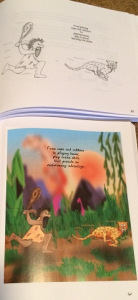
 Some cartoons, I went nuts on, and basically added whole backgrounds to. This was probably overkill, but it was kind of fun anyway. The tricky bit here was actually trying to keep to the spirit of the original cartoons. I have mentioned this before, but the originals were done rather hurriedly. Because the deadline was tight, I chose a deliberately naif style, something with very little elaboration in it. Figures had basically no relationship to actual human anatomy in most cases, and hardly anything was drawn from reference. I just didn’t have time to do a better or more detailed job.
Some cartoons, I went nuts on, and basically added whole backgrounds to. This was probably overkill, but it was kind of fun anyway. The tricky bit here was actually trying to keep to the spirit of the original cartoons. I have mentioned this before, but the originals were done rather hurriedly. Because the deadline was tight, I chose a deliberately naif style, something with very little elaboration in it. Figures had basically no relationship to actual human anatomy in most cases, and hardly anything was drawn from reference. I just didn’t have time to do a better or more detailed job.
Well, opinions on the cartoons are certainly divided! But plenty of readers tell me they are “charming” or “quirky” and I didn’t want to lose that quality of them having been doodles in a notepad (as suggested by the cover). So coloring them introduced an interesting problem: how to color them without it being either pure flat-shaded (which would have conveyed corporate cartooning) or overly elaborated? I ended up trying to mimic the original style, only with some custom Photoshop brushes. I tied hue to pressure sensitivity, giving a slightly more painterly look — and then stuck only to largish brushes, so that I couldn’t work in any great detail.
T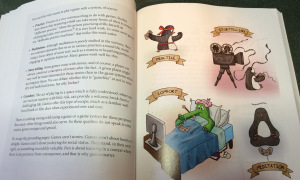 he book does have new material, of course. Here’s some of it. I was pretty conservative in adding pages of new material. For one, in the original, it is possible to simply read just the cartoon pages straight through without referencing the text, and vice versa. This meant that inserting material in the middle was a challenge — it had to work well between two pages of text and between two pages of cartoons. Most revisions were carefully constrained so that page breaks were preserved exactly between the two editions, for this reason. I also got the feedback loud and clear from many readers that “the book shouldn’t change too much” in terms of tone.
he book does have new material, of course. Here’s some of it. I was pretty conservative in adding pages of new material. For one, in the original, it is possible to simply read just the cartoon pages straight through without referencing the text, and vice versa. This meant that inserting material in the middle was a challenge — it had to work well between two pages of text and between two pages of cartoons. Most revisions were carefully constrained so that page breaks were preserved exactly between the two editions, for this reason. I also got the feedback loud and clear from many readers that “the book shouldn’t change too much” in terms of tone.
This page on alternate ways to play is something I wanted to include, though, because especially lately I have seen my positions on games be represented as rather more rigid and fundamentalist than they actually are (in fact, re-reading the book, I was struck by how much more rigid some of my recent essays seemed than some of the stuff in Theory of Fun… that was an interesting thing to notice!). So I wanted to make clear that there are lots of ways to enjoy games other than what is defined as “fun” in the book. (And yes, of course, for a videogame enemy, the monster under the bed is a player…!)
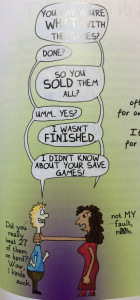 One of the things that has increasingly popped up as a critique over the years is that many of the cartoons seemed sexist; the player was all too often a guy, and there was a “hostile female” sort of vibe to too many of the punchlines. This was hard to address. First off, it’s hard to see about yourself or your work, of course. None of the cartoons were intended that way, but that’s how the impression came out, and what’s more, the impression seemed to intensify over time as more people pay more attention to the issue.
One of the things that has increasingly popped up as a critique over the years is that many of the cartoons seemed sexist; the player was all too often a guy, and there was a “hostile female” sort of vibe to too many of the punchlines. This was hard to address. First off, it’s hard to see about yourself or your work, of course. None of the cartoons were intended that way, but that’s how the impression came out, and what’s more, the impression seemed to intensify over time as more people pay more attention to the issue.
Secondly, there were big constraints on what I could do to address it. Redoing cartoons wholesale was something that was rather tricky given the book’s deadlines (one suggestion I got was to redo all the cartoons with nonhumans… alas, maybe next time!). I had to make a call image by image on how to, and whether to, fix the cartoon. There is one in there, for example, that was literally a spoof of the old Lockharts comic strip, where the sloshed husband returns home to a toe-tapping angry wife, only set with cavepeople. The source material was stereotypical, so the spoof was too. 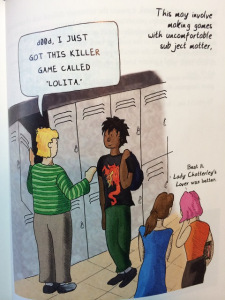 That one turned out to be too intricate to redo. A lot of the cartoons entail a somewhat violent punchline, and with those there’s just no way to win; either it’s violence against women or Others, like the one about designeritis, I was able to just rewrite all the captions in the image to portray the woman in the cartoon as an expert gamer. In the end, I hope I managed to move the line towards a more equal gender balance in terms of who ends up being the butt of the joke and who ends up being seen as the game expert.
That one turned out to be too intricate to redo. A lot of the cartoons entail a somewhat violent punchline, and with those there’s just no way to win; either it’s violence against women or Others, like the one about designeritis, I was able to just rewrite all the captions in the image to portray the woman in the cartoon as an expert gamer. In the end, I hope I managed to move the line towards a more equal gender balance in terms of who ends up being the butt of the joke and who ends up being seen as the game expert.
This applies to the text as well; there are many who disliked some of the material on brain differences between the sexes, and the science has moved on quite a bit in the last ten years. (There’s a lot of dislike of evolutionary psychology in general, I have found. Likely because it is so easily misused by those with an agenda). So that chapter saw quite a lot of careful revisions to emphasize that games in general were not at all always destined to be the province of males, or that women were in some way inferior as gamers. In the end, whether differences are inborn or not was never really the point of the material anyhow — it’s clear that some are, and some aren’t, and far too many of them are socially constructed. But whether or not a given person ended up with preferences through nature or nurture is immaterial compared to the fact that preferences do exist, and games have shown notable power to rewrite those preferences and confer new skills. That was what I always found exciting and fascinating.
Anyway, that’s just a very brief tour of some of what is different between the old and new editions. I know ebooks are where all the excitement is these days, but I couldn’t be more thrilled with how the dead trees version came out. It feels right for this to be the version on the shelf for the next ten years — and who knows, maybe then we’ll be doing yet another revision. (In hardcover? And the ebook, maybe animated? Who knows…!)
It’s available now and you should be able to get it before Christmas, if you plan to gift it. 
Theory of Fun for Game Design: Raph Koster: 9781449363215: Amazon.com: Books.
December 2, 2013
Theory of Fun reviews and press


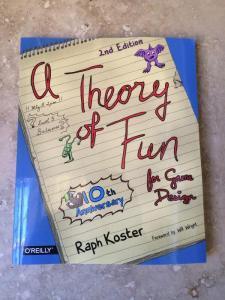 There have been a couple of pieces of coverage of the new edition of Theory of Fun.
There have been a couple of pieces of coverage of the new edition of Theory of Fun.
The first real review of the updated edition is here, in Finnish: Katsauksessa A Theory of Fun for Game Design. (You can read a Google Translated version: page one, page two). They kindly sent me a a translation of the final paragraph:
Even though A Theory of Fun for Game Design goes deep into the underlining mechanics of the gameplay and opens up the question of what makes a great game tick, it is written in a way that makes the book comprehensible and easy to read. There’s also a great reference section for further study on the subject, but even without this added value, A Theory of Fun for Game Design is easy to recommend to anyone interested to know a bit about games or game design – or why you especially like or dislike a game.
Wired Game|Life did a preview piece on the book that was pretty widely reprinted.
Another, funnier change: In the original edition of the book, there was a throwaway line about how nobody plays farming games anymore. “That,” Koster says, has now “turned into a page-long riff about farming games and about how modern farming games teach business rather than farming.”
This piece was also picked up by BoingBoing, which noted
Hard to believe it’s been ten years since the initial release of Raph Koster’s indispensable A Theory of Fun for Game Design, a book that does for game-design what Understanding Comics did for sequential art.
There may be more reviews on the way… I should also mention that the ebook edition is in O’Reilly’s CyberMonday sale today, at 50% off (along with all their ebooks).
The print edition hits this week, and as you can see from the picture, came out very nicely… all glossy and everything. 
November 26, 2013
Theory of Fun ebook NOW OUT! 50% off!


 It’s out! And O’Reilly has a special deal:
It’s out! And O’Reilly has a special deal:
Save 50% on Game Design Ebooks & Videos – Deals - O’Reilly Media.
For just this week, game design ebooks are half off, including the full-color 10th anniversary edition of A Theory of Fun for Game Design. Oh, and they’re DRM-free too.
Use discount code WKGMDES. It’s only good until December 4, 2013 at 5:00am PT. And even though it’s only good for the ebook version, as it happens, the print version is supposed to hit Dec 5th, so there’s a nice symmetry there. 
Buy the O’Reilly ebook here. (PDF, mobi, or ePub). Don’t forget the discount code!
Buy Theory of Fun for Kindle
 here.
here.I got a sample copy of the paperback in hand too… glossy throughout, it’s really nice! I have trouble picturing the book in black and white now. You can pre-order it at the above links.
November 22, 2013
EVA13: Video of “El mundo de sistemas”

Here is the full video of my talk at EVA13, entitled “El mundo de sistemas” (the world of systems). It’s in Spanish, and it’s an hour and a half long!
Sorry, no translated subtitles or anything. The talk starts out talking about systems and games, how there are many sorts of games but that a large proportion of them have what I call ludic systems underlying them. I talked a little bit about what some of the implications of systems are, how we learn from them and what sort of lessons they teach. And, of course, also how flaws in systems (or even emergent properties) can cause systems to really run amok, or enable players to really break everything.
That then leads to some anecdotes and postmortem thoughts from Ultima Online and Star Wars Galaxies. Most of these are probably ones that many of you have heard about before:
How young we were when we did UO.
How we wanted to create a virtual world with UO, not just replicate Diku mechanics… probably before there was enough tech power to actually do it. Like, could we ship on a CD? I mean, we needed one hundred megs of art, which was insane. Could we exceed the 14.4 modems that most people had and require a 28.8?
How we started out basing the game on an artificial life simulation.
All the exploits that detailed systems and sims led to, including the death of Lord British at the hands of Rainz, protests, guilds, player governments, etc.
Controlling playerkilling, and all the systems we tried for it, such as the bounty system — which led to exactly the opposite sort of behavior that we wanted.
The mooning at Moonglow
How we foolishly originally thought we would do four continents, and how we transplanted some of the design work from the other continents to the main UO map (which is where the extra islands came from).
Where Green Acres came from.
The story of making Second Age when I was the only original team member left.
8×8 tracking on “chunk eggs” and what the eventual consequences were: 8×8 macroing, bots on ships, etc.
The origin of rares, which may haveled to free to play… and was an accident.
The Star Wars Galaxies dynamic terrain system, which I really should write up for the historical record. (There is a nice article on the Wayback Machine from the pre-launch days…) And of course, all the issues we then had with pathfinding, graphics performance, collision, AI, and so on. Not to mention how hard it was for the artists to use.
The dynamic point-of-interest system.
How players built cities to “claim” static content areas.
The range of professions and how the economy hung together (or not).
How we put in boring stuff on purpose in order to drive social interaction
Social professions, such as the musicians (and touring bands and beauty pageants and entertainment impresarios and film companies)
The Jedi Holocron disaster
So… if we have SO MANY HOLES when we make these sorts of systems, what makes us think we can do gamification? Why are we surprised to hear about things like LIBOR fixing?
Which leads to ending with the thoughts I have expressed elsewhere before: that through happenstance, we are the ones educating children, the ones who have been training ourselves in creating large-scale systems… and how qualified are we? Possibly more so than legislators. But probably not qualified enough. What sort of future are we creating?
Then some fun questions from the audience…
How did we handle dealing with exploits — more robust sims, or hacking the sim away (we started with the former, and evolved towards the latter). Talked here about house break-ins and the Carpenter’s Siege of Trinsic.
A question about PvP and competition, and what lessons players take away, which leads to a retelling of the baby-and-burning-building joke from A Theory of Fun, and the ways in which we learn from systems.
My favorite question: “In fifteen years we’ll be able to reproduce all the connections of the human brain in a computer, and in 50 years, store all knowledge too. So in theory, we could reproduce our universe in the computer. So, we might be living in a simulation. What do you think?” My answer: “I think I don’t have root access.”
Was it tech limits? What are the limits we face now? Which leads to my saying it’s about ambition. We could build a virtual world where we simulate down to the chemical reaction level right now, and allow players to invent gunpowder. It’s not technology that is the limit here: it’s imagination, and will, and ambition.
Thanks to Paul Dahuach, who apparently was filming from the audience. 
November 6, 2013
GDCNext13: Slides for Playing with ‘Game’

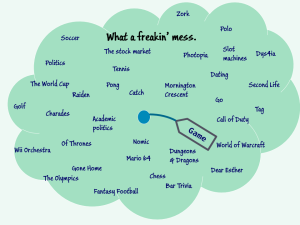 Here are the slides for the talk I gave yesterday, entitled “Playing with ‘Game.’”
Here are the slides for the talk I gave yesterday, entitled “Playing with ‘Game.’”
The talk starts out with some basic semiotic theory — basically, the difference between a thing, the name we give a thing, and what the thing actually means. This serves as an entry point into talking about not only the way the word “game” is incredibly overloaded with different people’s interpretations, but also as a way to start discussing the way games themselves can mean things.
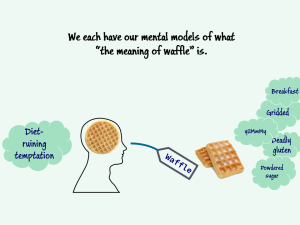 This leads to exploring the notion of “play” as space — free movement within a system, which is not a new idea at all, ranging from Derrida to Salen & Zimmerman. And then to looking at the two big sorts of play I see: the play of the possibility space of a set of rules, and the possibility space of a set of symbols or signs, which we might be more used to calling the thematic depth of a literary work. Along the way I break down writing techniques, game design techniques, and more, trying to find the ways in which these tools can be applied to games of different intents — which tools work best for a given craftsperson’s purpose?
This leads to exploring the notion of “play” as space — free movement within a system, which is not a new idea at all, ranging from Derrida to Salen & Zimmerman. And then to looking at the two big sorts of play I see: the play of the possibility space of a set of rules, and the possibility space of a set of symbols or signs, which we might be more used to calling the thematic depth of a literary work. Along the way I break down writing techniques, game design techniques, and more, trying to find the ways in which these tools can be applied to games of different intents — which tools work best for a given craftsperson’s purpose?
I was really stuck on this talk. I had it conceptually all worked out, and could ot figure out a good way to convey it at all. My first several drafts were dry and jargony and a mess. And then I saw Daniel Benmergui give a talk at EVA in Argentina about the difference between “sense” and “meaning,” using David Lynch and Braid as examples, and it unlocked everything for me.
So if you want to know why I think a six-word story is like Journey and how Howling Dogs is like Super Mario Brothers, this is the talk for you. And if the above sounds incredibly intimidating and way too much like grad school in literary theory, the good news is that the talk is full of waffles.

